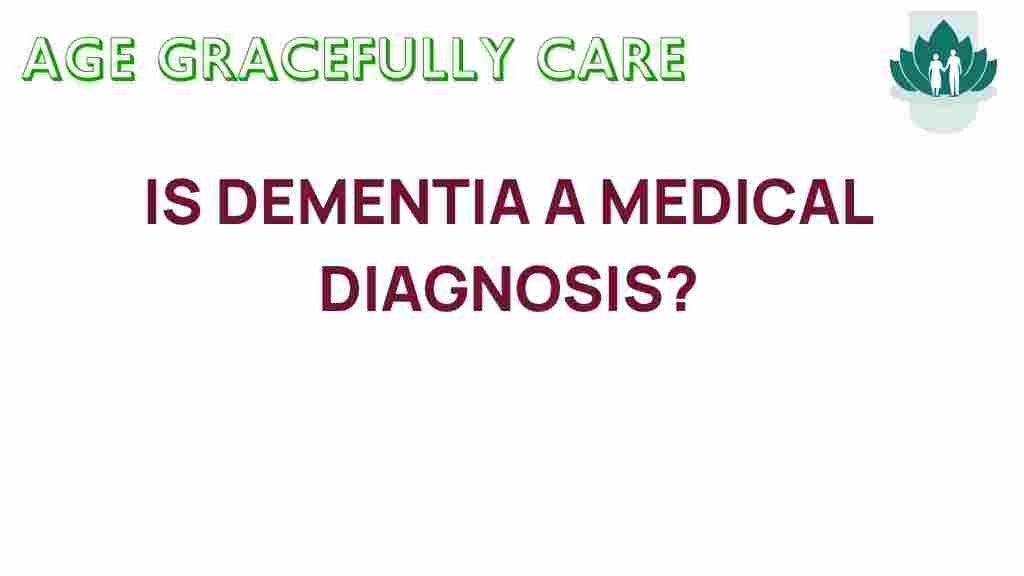Is Dementia a Medical Diagnosis? Understanding the Complexities
Dementia is a term that often evokes concern and confusion. As a broad descriptor for a range of cognitive impairments, it raises questions about its classification as a medical diagnosis. In this article, we will explore the intricacies of dementia, its relationship with medical diagnoses, and how it fits into the broader categories of cognitive health, neurological disorders, and mental health. We will also discuss the diagnosis criteria used by healthcare professionals, the importance of early detection, and the implications for patient care.
What is Dementia?
Dementia is not a single disease but rather a collection of symptoms associated with a decline in cognitive function that interferes with daily life. It primarily affects memory, thinking, and social abilities. While Alzheimer’s disease is the most common form of dementia, several other types exist, including vascular dementia, Lewy body dementia, and frontotemporal dementia.
The Importance of Medical Diagnosis
Understanding whether dementia constitutes a medical diagnosis is crucial for those affected by cognitive health issues. The term “medical diagnosis” refers to the process of determining a disease or condition based on a patient’s symptoms, medical history, and diagnostic tests. In the context of dementia, the diagnosis involves a comprehensive evaluation that identifies the type and severity of cognitive impairment.
Diagnosis Criteria for Dementia
Diagnosing dementia involves several steps, which are guided by established criteria. The most widely accepted guidelines include:
- Clinical Assessment: A thorough review of the patient’s medical history and symptoms.
- Cognitive Testing: Standardized tests to evaluate memory, attention, problem-solving, and language skills.
- Neuroimaging: Techniques such as MRI or CT scans to identify structural changes in the brain.
- Laboratory Tests: Blood tests to rule out other conditions that may cause similar symptoms.
Types of Dementia and Their Medical Implications
Each type of dementia has unique characteristics and may require different approaches to diagnosis and treatment:
- Alzheimer’s Disease: The most prevalent form, characterized by progressive memory loss and cognitive decline.
- Vascular Dementia: Often resulting from stroke or other vascular issues, leading to impaired blood flow to the brain.
- Lewy Body Dementia: Associated with abnormal protein deposits in the brain, causing cognitive fluctuations and visual hallucinations.
- Frontotemporal Dementia: Primarily affects the frontal and temporal lobes, leading to changes in personality and social behavior.
Challenges in Diagnosis
Diagnosing dementia can be challenging due to overlapping symptoms with other medical conditions. Mental health issues such as depression and anxiety may mimic cognitive decline, complicating the diagnosis process. Additionally, the stigma associated with dementia can deter individuals from seeking help, leading to delays in diagnosis and treatment.
Step-by-Step Process for Diagnosing Dementia
The process of diagnosing dementia typically follows these steps:
- Initial Consultation: The patient and their family discuss observed symptoms with a healthcare provider.
- Comprehensive Evaluation: The doctor conducts a detailed medical history and physical examination.
- Cognitive Testing: Formal tests are administered to assess memory and cognitive abilities.
- Diagnostic Imaging: Scans are done to visualize the brain and rule out other conditions.
- Follow-Up Assessments: Continuous monitoring and re-evaluations may be necessary to track progression.
Importance of Early Diagnosis
Early diagnosis of dementia can significantly impact patient care and management. Recognizing symptoms early allows for:
- Timely Intervention: Enabling healthcare providers to offer treatments that may slow progression.
- Planning Ahead: Allowing patients and families to make informed decisions about care and lifestyle adjustments.
- Support Systems: Connecting families with resources and support networks for better coping strategies.
Patient Care in Dementia
Effective patient care for those diagnosed with dementia requires a multi-faceted approach, including:
- Medication Management: Utilizing drugs that may alleviate symptoms or manage co-existing conditions.
- Cognitive Therapies: Engaging patients in activities that stimulate cognitive function.
- Supportive Environments: Creating safe and supportive living spaces to promote independence.
- Family Education: Educating family members about dementia to foster understanding and compassion.
Common Misconceptions About Dementia
Several misconceptions exist regarding dementia that can hinder understanding and treatment:
- Dementia is a natural part of aging: While age is a significant risk factor, dementia is not inevitable.
- All dementia is Alzheimer’s: Alzheimer’s is just one form of dementia among many.
- People with dementia cannot improve: Early intervention can help improve quality of life and slow progression.
Troubleshooting Tips for Families
For families navigating a dementia diagnosis, the following tips can help manage challenges:
- Establish Routines: Consistency can provide comfort and security for individuals with dementia.
- Stay Engaged: Encourage participation in social and cognitive activities to promote mental health.
- Seek Professional Help: Don’t hesitate to reach out to healthcare providers for guidance and support.
- Connect with Support Groups: Engage with community resources and support networks for additional assistance.
Conclusion
In summary, dementia is a complex condition that encompasses various cognitive disorders, including Alzheimer’s and other neurological disorders. While dementia itself is not a singular medical diagnosis, it is a term that describes a range of symptoms necessitating medical assessment and intervention. Understanding the diagnosis criteria, recognizing the importance of early detection, and fostering effective patient care are essential for managing dementia effectively. As we continue to unravel the complexities of this condition, it is imperative that families, caregivers, and healthcare providers work together to support those affected by dementia in their journey towards better cognitive health.
For further information about dementia and available resources, consider visiting the Alzheimer’s Association for comprehensive support and guidance.
Additionally, explore local resources to connect with healthcare professionals who can assist in navigating the complexities of dementia care. For more details on healthcare approaches, check out our article on mental health strategies.
This article is in the category Health and created by AgeGracefullyCare Team
